A Vir Chakra and Padma Bhushan awardee Lt. Gen. Satish Nambiar (retd) takes you on his tenacious journey in the Armed Forces. He also speaks about Army’s wonderfully holistic way of "breaking you in" from the civilian mode of thinking and making you physically and mentally tough as well as bringing about a change in the mindset

Tall, fit and immaculately turned out, as you would expect a fauji couple to be, Lt. Gen. Satish Nambiar and his better half, Indira, are nevertheless, a surprise in more ways than one. Not only do their looks belie their age (he is in the early eighties and she is in the mid-seventies), but their views are disarmingly modern and "with it" so to speak. At the same time, a conversation with them is a throwback to the magic of the yesteryear when people stood for causes that went beyond themselves. To a time when certain "sacrifices" were not viewed as such, but something that you simply did without a fuss and got on with it.
A Vir Chakra and Padma Bhushan awardee to boot, Lt. Gen. Nambiar is someone who has enjoyed a glorious career both as a serving officer and after. Commissioned on December 15th, 1957 from the Indian Military Academy, Dehra Dun, into the 20th Battalion of the Maratha Light Infantry, he saw active service in the country’s North-Western and North-Eastern theatres, including counter-insurgency operations, and in the Indo-Pakistan conflicts on the sub-continent: in 1965 in the Sialkot Sector and; in 1971 in the Eastern theatre (Bangladesh). Awarded the Vir Chakra for bravery in battle with the 1st Battalion The Maratha Light Infantry (Jangi Paltan) during the Indo-Pak conflict in 1971, he is also the recipient of the Ati Vishisht Seva Medal in 1991 for distinguished service of a very high order and the Param Vishisht Seva Medal in 1994 for distinguished service of an exceptional order.
Armed with a Master’s degree in Defense Studies from the University of Madras, Lt Gen. Nambiar has been actively engaged since retirement in the study and analysis of UN peacekeeping operations, national security matters, including Defense strategy, and international relations. He has also authored chapters in international publications on national security aspects, peace operations, international intervention, and “just war and genocide’’. In 2009, in recognition of his sustained efforts in the study and analysis of ‘National Security Affairs’, he was conferred the Padma Bhushan.
Amidst all this, he has been ably partnered by his wife, the quiet and self-effacing Indira, who believes love is all about support—not just for one's partner but all that he stands for. Elegant, accepting and tolerant, she has been the perfect foil to this dynamic officer. Despite having met in the ‘shaadi ka mandap’ and not one moment before, this matrimonial bond of 48 years is based on a winsome blend of the old and new. This is their journey and this is how they share it.
Gen. Nambiar: I was born in Mumbai in 1936 into a family belonging to the Nair community, a warrior clan in Kerala.. However, I am a bit of a pseudo, in that my childhood was spent largely in Mumbai. My father was in the services, and that meant we lived out of our state. While I did my first three years of schooling in Pune’s St. Vincent’s High School in the early nineteen forties, the rest of my education was in Mumbai (St Mary’s High School and St Xavier’s College). While in college, I was part of the NCC, and my instructors just happened to be from the 20th Maratha Light Infantry and that was how and why I later opted for the Marathas (laughs). At that age, a chap really doesn’t have much of a clue about what he is doing, but things worked out just fine.
Anyway, the interaction with the instructors impressed upon me that the army might be a fine career choice. In those days, one had the choice of joining the NDA after school or enrol as a direct entry to the Indian Military Academy after your Intermediate. I chose the latter.
"The military leadership, I must stress, is different from that which manages a company. While managing a company, if it goes broke, it can be revived. But in battle if you lose, you’ve lost lives and your ground. No second chances there’’
 As a young officer in 20th Battalion, The Maratha Light Infantry: 1958
As a young officer in 20th Battalion, The Maratha Light Infantry: 1958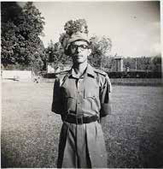 As a Gentleman Cadet at the Indian Military Academy in 1956.
As a Gentleman Cadet at the Indian Military Academy in 1956.Oh, naturally, there was a complete departure. The army has a wonderfully holistic way of “breaking you in” from the civilian mode of thinking. There is an accent on both physical and mental toughness, as well as bringing about a change in the mindset. As a civilian, punctuality is a pipe dream; you tend to take things casually.
The same holds true for jawans—raw young fellows of 16 and above are put through the same rigorous training in order to break them out of the mold of civil life. In the armed forces, everything has a time, and every person, his role. The drills that the Army, Navy and Air Force are shown practicing are not just for show, you know. They are supposed to inculcate discipline in every way. Part of the mechanism is meant to teach you to obey instinctively, and respond to the exact requirement of that day. It may seem like a mechanical way of doing things, but that’s not true really you have to use your initiative and imagination in various situations.
When a superior officer gives a command, the subordinate is supposed to obey—and for a reason. At the same time, the senior has to know what he is doing because his every decision has an impact on his men. All this training is to bring home the fact that in war, it’s all or nothing. That there are no runners up; you win or you lose.
"Our political leadership has by and large had very little knowledge about the army. Post-independence, for example, there was little understanding about the security of India because it had been looked after by the British. This is most unlike the West, where most leaders had seen war, including Charles de Gaulle of France and Mao of China. Ditto with Russia”
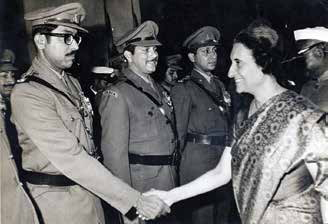 Being greeted by PM Indira Gandhi: March 1972.
Being greeted by PM Indira Gandhi: March 1972. With PM Indira Gandhi: March 1972.
With PM Indira Gandhi: March 1972.There are two or three dimensions to this.
I, for one, I am not one for the loosening of the rigors—particularly when they have proven themselves in terms of output. Discipline is one of the key pillars of the academy and that ought not to change. Of course, there are times when people overdo things and that should not happen. Even ragging within limits—and with the right spirit, with an eye to bringing out a person’s potential—is not a bad thing. The academy, it must be borne in mind, is trying to create leaders who will be able to sustain the direst circumstances. This leadership, I must stress, is different from that which manages a company. While managing a company, if it goes broke, it can be revived. But in battle if you lose, you’ve lost lives and your ground. No second chances there.
An officer is not only responsible for the outcome, but also for the well-being of his subordinates. And when you are demanding that level of subordination from your men, your decision making has to be bang on. That said, I don’t think it’s completely possible to do away with technology. So instead of fighting the battle to get rid of it, perhaps we ought to be asking how best we can use it and how we can strike the right balance.
Yes, there will be instances when technology will be dangerous. Like a regiment on patrol in an area that is seeing live action. Even a single mobile possessed by a jawan can give the position away. So, this is one of the serious challenges that commanders face. Conversely again, I don’t buy into the maxim that future wars will be won or lost by technology; war will always be won by the mind. Human nature is at the root of this—it has the capacity for good and it has the capacity for great violence as well. People kill for the sake of it, and that is that. We are inherently aggressive creatures unlike the rest of the animal kingdom (laughs).
So at least as far as the military goes, I don’t think technology can ever replace leadership. While technology will certainly change the nature of warfare, military leadership will be a big determinant of the outcome.
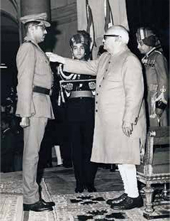 Receiving the Vir Chakra from President VV Giri: March 1972
Receiving the Vir Chakra from President VV Giri: March 1972 In the National Cadet Corps at St Xavier’s College Bombay: 1954
In the National Cadet Corps at St Xavier’s College Bombay: 1954Well, there are very many. But if I had to name a few, they would include
"In the armed forces, everything has a time, and every person, his role. The drills that the Army, Navy and Air Force are shown practicing are not just for show. They are supposed to inculcate discipline in every way. Part of the mechanism is meant to teach you to obey instinctively, and respond to the exact requirement of that day”
 Pinning UN medal on members of the Argentinian contingent: October 1992.
Pinning UN medal on members of the Argentinian contingent: October 1992.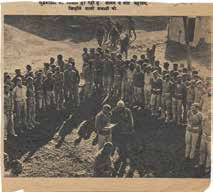 Taking the surrender of the Jamalpur garrison: 11th December 1971.
Taking the surrender of the Jamalpur garrison: 11th December 1971.Well, the civilians and general public at large have always respected the men in uniform. It gives us the strength to carry on. However, our political leadership has by and large had very little knowledge about the army. Post-independence, for example, there was little understanding about the security of India because it had been looked after by the British. This is most unlike the West, where most leaders had seen war, including Charles de Gaulle of France and Mao of China. Ditto with Russia. In fact, I happened to read this article the other day that said as many as 34 out of 45 Presidents of the US had seen live combat. Now that’s a large number and explains the leadership’s understanding of the significance of the armed forces. We have never had conscription in India, just volunteers. The compulsion to sign up was not there. Thus, this lack of knowledge has led to a mistrust of the military. Add to that the happenings in our immediate neighborhood as in Pakistan and Burma for example and briefly in Bangladesh where military dictatorships had assumed charge. This led to a completely unfounded fear of `what if something similar happens here.’
Even today, by and large, it’s sad to say that India’s political leadership has made little effort to understand the army. There were a few exceptions of course, like Indira Gandhi and Narasimha Rao. Of course, I must add that I am only talking from my personal experience.
But then there is the civilian bureaucracy, including the police that has placed itself between the army and the leadership. This is because, by and large, the armed forces are a highly respected lot. Unlike the civilian bureaucracy and the police, the forces have a clear-cut charter that does not involve them doing the bidding of the politicians.
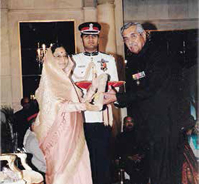 Receiving the Padma Bhushan from President Pratibha Patil: 2009.
Receiving the Padma Bhushan from President Pratibha Patil: 2009.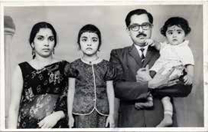 The two of us, daughter Rekha and son Rajesh: March 1975
The two of us, daughter Rekha and son Rajesh: March 1975We have been, by and large, so obsessed with Pakistan that we tend to forget that in the days to come it is China that is going to be our greatest rival in the neighborhood. Having said that, we have this tendency to equate ourselves with China in terms of size, strength and clout. Now this is wrong and misleading, for while China may be highest on our list of rivals, the fact is that for the Chinese we are not topmost of their priority list. They have a lot to deal with—the US, Japan, Russia, and possibly even Vietnam, being higher up than India. This is because China has disputes with many countries, not just India. We must use this to our advantage.
With regard to Pakistan, let’s be realistic. This was a country formed on an anti-India agenda. Worse, the two-nation theory that gave them the reason for their existence ‘India for Hindus and Pakistan for Muslims’ was conclusively debunked in 1971 with the formation of Bangladesh, thanks to the basic cultural and political incompatibility with the Bengalis of East Bengal. So, India helped break that country up. Why, I myself was amidst the august company to have entered Dacca (Dhaka) on December 16, 1971 along with my men. The result was the largest public surrender and largest taking of prisoners of war—93,000 of them, a humiliating event for any professional army. Given that the local populace was fed on stories of how one Pakistani could take on at least ten Indians, this was just too bitter a pill to swallow. And that deep sense of hurt, the desire for revenge has remained since.
 With Prime Minister Narasimha Rao on Republic Day 1992.
With Prime Minister Narasimha Rao on Republic Day 1992.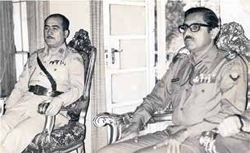 As member of an Indian Army Training Team in Baghdad, Iraq: 1979.
As member of an Indian Army Training Team in Baghdad, Iraq: 1979.That’s not strictly true. While China certainly has clout there, it’s not right to rate the Pakistanis so low. It is important to be fair in the assessment of one’s adversary in order to arrive at an accurate estimate. In order to understand the link between China and Pakistan, one must go back to the seventies when Pakistan brought China back into the international environment once again, by acting as a go-between between Kissinger and them. This is something China has never forgotten and has been an all-weather friend for Pakistan. It will not let Pakistan down easily, come what may. They may not directly intervene in case of an Indo-Pak conflict but they will certainly put a lot of pressure on us. So these factors must be properly understood when dealing with both Pakistan and China.
A similar equation exists between Pakistan and the US. The Americans will never completely dump Pakistan, no matter what Trump says now. There are many sections in American society that are strongly pro-Pakistan.
When it comes to floods and natural disasters, of course, you are happy to be of service. Besides, the army is supposed to give assistance to the civil administration in case of breakdown of law and order. The first instance of dealing with insurgency was in Nagaland. It is not a nice feeling of a great job dealing with your own countrymen. As a young man, I have chased rebel groups and I know the feeling. You are at a severe disadvantage as compared to dealing with outsiders. Having said that, if the government feels we must be called in as an instrument of last resort, great. But it’s a shame when they use the army as the first resort; that does not speak well of the leadership.
Brought together for the first time at the marriage mandap, Indira and Lt. Gen. Nambiar (retd) have had a long innings of togetherness, lived with grace and mutual understanding, committed to each other and the armed forces calling. As Indira so succinctly points out, it’s all about faith, tolerance and a little bit of patience
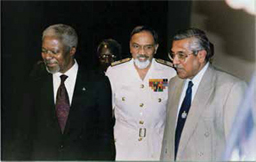 Receiving UN Secretary General Kofi Annan at the United Service Institution of India in 2000; also in the picture is Chief of Naval Staff Admiral Sushil Kumar.
Receiving UN Secretary General Kofi Annan at the United Service Institution of India in 2000; also in the picture is Chief of Naval Staff Admiral Sushil Kumar.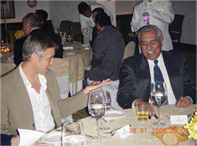 With George Clooney at a dinner in New Delhi: 2005.
With George Clooney at a dinner in New Delhi: 2005.indira: Truth be told, we met in the mandap, quite literally at that (laughs). The thing is he did not get a leave and so we could only meet on the day of the ceremony.
However, you must remember that the year was 1970, when one pretty much did as one was told. It was an arranged marriage, through and through, and we trusted our parents to do the right thing by us. Having had an elder sister who was senior to me by 15 years and married into the Air Force, I sort of knew what marriage to a Defense officer would entail.
in: I soon discovered that he was very much like my father —a very great and truthful man. I really respect that about him, as well as his absolute commitment to everything he takes on; the fact that he gives his best to the task on hand.
gen. n:Oh, I admire her on so many counts. First and foremost, her complete frankness is amazing. I may have been irritated on occasion by her sheer honest brutality, but I know I can always count on her for the right feedback. Secondly, she has always been very committed to my work and the causes that were dear to me. Thirdly, she helped me look after my men by taking care of their wives. Last but not the least, she largely brought up our children by herself, considering that I was away most of the time. What’s more, she brought them up well.
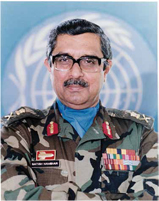 First Force Commander and Head of Mission of the UN Peacekeeping Forces in the former Yugoslavia: 3rd March 1992 to 2nd March 1993.
First Force Commander and Head of Mission of the UN Peacekeeping Forces in the former Yugoslavia: 3rd March 1992 to 2nd March 1993.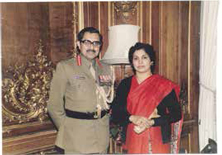 As Military Adviser, High Commission of India: 1984.
As Military Adviser, High Commission of India: 1984.gen. n: First of all, I would like to address the misconception that more youngsters in my time wanted to sign up (laughs). That’s not true. Even back in the fifties when I completed my school and college, the brighter chaps always opted for the corporate world as there was more money. Everyone knew there was none in the army (laughs). So that continues even today, even though I do concede that yes, there are way more options in civil life today that are attractive to youngsters. That said, the pay and the remuneration in the armed forces are much better than what they were in my time. And plus, there’s greater quality of life, greater camaraderie that are very rewarding in their own way. This is not to suggest that things are easier in the corporate world. Why, it’s a relentless rat race and it’s directly linked to results. If you don’t produce them, you are out of a job. In the armed forces, there is still hope that you can get away with it (laughs).
in: Complete non-interference and total support. We have always believed in letting children follow their own heart. Give children the right moral values, and have faith in their ability to take their own decisions and do the right thing— that’s what we have always practiced.
gen. n: One fine day, after graduation he told me he wanted to join the army. I was thrilled. It seemed like the natural thing to do; he had observed army life from the outset and seen what it entailed. He loved sports and the outdoors. It seemed like the natural choice. However, it isn’t right to say that the force’s children don’t follow in their father’s footsteps. Mine did— and he was the seventh second-generation officer on the rolls to have joined his father’s battalion. This was a big deal considering the total strength of the battalion. He was commissioned in 1996 and is a colonel now.
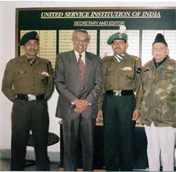 With Param Vir Chakra awardees at the United Service Institution of India: 2004
With Param Vir Chakra awardees at the United Service Institution of India: 2004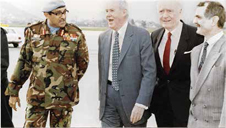 With former US Secretary of State Cyrus Vance in Sarajevo: May 1992.
With former US Secretary of State Cyrus Vance in Sarajevo: May 1992.gen. n: Well, one must understand and accept the fact that times and socio-cultural demographics are ever-changing. Thus, the demands on his generation are way more than what they were on mine.
In my time, the men were less educated, largely from the rural areas and more accepting of their seniors’ orders. In his time too, they are disciplined and committed—provided they are convinced that their officer is doing the right thing and is making the right choice for them. This is a more discerning and intelligent lot, they know their rights and privileges, and there’s no wishing it away.
The demands on leadership always get more and more stringent, and well, that’s how it goes. So while unlike my days when a chap would help you sweep the floor if you asked him to, he won’t do such a thing today. But the point is you shouldn’t be asking him to. The good news is that our officers have always proved more than equal to the challenge.
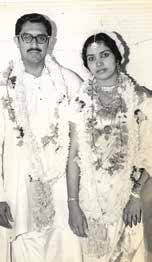 Wedding on 3rd May 1970 at Kadalayi Temple, Kannur.
Wedding on 3rd May 1970 at Kadalayi Temple, Kannur.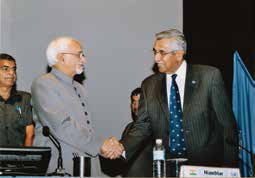 With Vice President Hamid Ansari at the release
of the book titled “For the Honor of India – A History of Indian Peacekeeping”: May 2009.
With Vice President Hamid Ansari at the release
of the book titled “For the Honor of India – A History of Indian Peacekeeping”: May 2009.in: Well, we ladies had a role to play in various set ups like the Ladies Club, the AWWA and so on. Empowering the jawans’ wives by teaching them skills like embroidery, knitting, etc., were part of the deal. However, things have changed now. The women are pretty educated and aware and so things have to be made a little more interesting and more in sync with their needs. I always believed in keeping a friendly and open line of communication with every lady, including the younger ones. They must feel comfortable to speak to you.
in: Oh, all of them—for the simple reason that it’s not the place but the people who help make a place memorable. I must mention here that we’ve had a wonderful innings in the army, thanks to the good and supportive people around us, both seniors and juniors. Both of us have been really lucky that way. We had a really good time everywhere. Plus, I made it a point to know each and every wife, no matter how junior. I always kept an open home—there was always something happening at my place, some party or something we were practicing on. There was a great camaraderie and bonhomie. Anyone could come up to me with their problems at any time. In fact, just the other day, I was at the hospital and a young woman came up and said hello. We were meeting after a long time. It was a really nice feeling.
in: Faith and tolerance—and a willingness to understand the other person. In my case, I didn’t know him at all. Each day was like a new episode on the Discovery channel (laughs) but one took the time and effort to make it work. The one reason why relationships don’t last these days is the lack of patience. With patience, you can conquer a lot together, without it, the going gets tough.
"In my case, I didn’t know him at all. Each day was like a new episode on the Discovery channel (laughs) but one took the time and effort to make it work. The one reason why relationships don’t last these days is the lack of patience. With patience, you can conquer a lot together” - Indira Nambiar
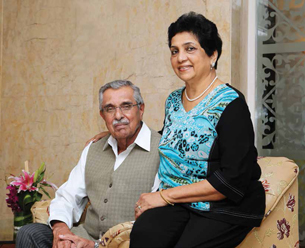
in: It’s a pretty simple one, really. Give children the sense of security to be able to come and talk to you on every topic. Even if they commit murder, they must be able to tell us as parents. I believe this transparency and communication has worked with both my children—my army officer son as well as my daughter who is an interior designer.
in: Well, technology like emails and mobile phones has certainly made life easier as compared to our time. I remember as a young wife waiting for letters that would come at once, in a stack. Then you had to sort them out date-wise and read them (laughs). So yes, I tell my daughter-in-law that they are much luckier than us in that regard.
gen. n: Be grateful for God’s blessings and all that you have. Don’t complain about what couldn’t be; instead, celebrate what is. Most important of all, don’t ill-wish anyone.
in: To that, I would add: be flexible enough to find sustenance and happiness in every circumstance. As an army family, we have lived in every accommodation, ranging from the luxurious to the austere. Be thankful, be accepting and be graceful.
By Vinita Deshmukh & Kalyani Sardesai